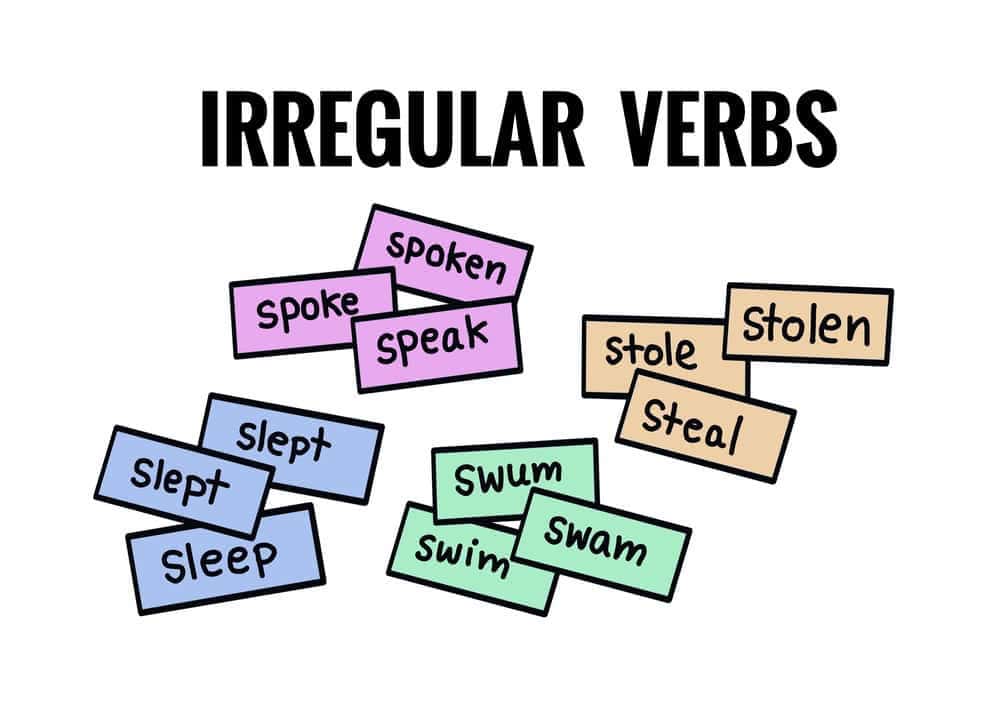If English were a perfectly logical language, irregular verbs wouldn’t exist.
But, of course, English loves to keep us on our toes.
Unlike regular verbs that neatly follow the “-ed” rule for past tense (like walk → walked), irregular verbs play by their own set of rules, often with no rhyme or reason (go → went, buy → bought).
These unpredictable verbs are some of the most commonly used in the language.
So, in this guide, I’ll break down what are irregular verbs, provide a full list, and show you exactly how to use them in real-world sentences.
Let’s get straight into it!
What Is an Irregular Verb?

Irregular verbs are trick words that refuse to follow the standard rule of simply adding “-ed” to form their past tense.
Instead, they change in unpredictable ways or sometimes don’t change at all.
Take “go,” for example. If you’re a non-native English speaker, you’d think its past tense should be “goed,” right? Nope, it’s “went.”


Never Worry About AI Detecting Your Texts Again. Undetectable AI Can Help You:
- Make your AI assisted writing appear human-like.
- Bypass all major AI detection tools with just one click.
- Use AI safely and confidently in school and work.
Similarly, the past tense for “eat” should logically be “eated,” but it’s “ate.” And then there’s “cut,” which just stubbornly refuses to change at all.
Now, why do these verbs exist? Because English is a linguistic melting pot.
It borrows from Old English, Latin, Norse, French, and a dozen other influences, each with its own grammatical quirks.
Over time, some verbs resisted the standard past tense rule and kept their historical forms, hence, we have irregular verbs.
Difference Between Regular and Irregular Verbs
Regular verbs are the reliable, rule-following citizens of the English language.
They form their past tense simply by adding “-ed” (like “walk” → “walked” or “jump” → “jumped”). No surprises there.
Irregular verbs, on the other hand, don’t care about rules.
They follow their own historical evolution, which means their past tense forms are completely unpredictable.
Some change vowels (like “sing” → “sang”), some change entirely (like “go” → “went”), and some don’t change at all (like “put” → “put”).
What makes irregular verbs frustrating is that there’s no universal rule to memorize them.
The only way to master them is through repetition and practice.
Native speakers learn them naturally over time, but for English learners, it’s one of the trickiest parts of grammar.
Why Irregular Verbs Don’t Follow Standard Past Tense Rules?
Blame history. English has evolved from a combination of languages, and irregular verbs are linguistically preserved versions of the way people used to speak centuries ago.
While most verbs eventually conformed to the simple “-ed” past tense structure, some resisted change and kept their old, irregular forms.
Another reason irregular verbs exist is their frequency. The most commonly used verbs (like “be,” “have,” “go,” “do”) tend to be irregular.
Such frequently used words resist change. They’re spoken so often that their traditional forms stick around.
How Do Irregular Verbs Work?
How do you know when a verb is irregular, and what do you do with it? Let’s break it down.
No “-ed” Rule for Past Tense & Past Participle Forms
With regular verbs, life is simple: just slap an “-ed” on the end, and you’ve got your past tense and past participle.
But irregular verbs don’t play by those rules as we saw in the previous section.
Instead, their past tense and past participle forms often look completely different from the base verb.
For the word “run, ” you would guess that its past tense is “runned,” but it’s actually “ran.”
And its past participle is “run” again. So you say, “I ran yesterday,” but “I have run every day this week.” (I know you raised your eyebrows there. I did, too!)
Some irregular verbs completely change form in the past participle.
“Write” becomes “wrote” (past tense), but its past participle is “written” (as in “I have written a book”).
Common Patterns in Irregular Verbs (But No Fixed Rule)
Irregular verbs seem very chaotic at first however, they do follow some loose patterns.
They’re not completely random. It’s just that the patterns aren’t universal.
Here are a few common ones:
- Many irregular verbs shift their vowel sounds in the past tense.
- Sing → Sang → Sung
- Drink → Drank → Drunk
- Begin → Began → Begun
- Some verbs are the same in all three forms.
- Cut → Cut → Cut
- Put → Put → Put
- Hit → Hit → Hit
- Some verbs take an -en suffix in the past participle.
- Break → Broke → Broken
- Choose → Chose → Chosen
- Speak → Spoke → Spoken
- A handful of verbs seem to have been plucked from a different language altogether.
- Go → Went → Gone (No resemblance between “go” and “went” at all!)
- Be → Was/Were → Been (A verb with two past tense forms? Of course, English had to make it even harder.)
Irregular Verbs vs. Regular Verbs (Key Differences)
Verbs are the backbone of any language, but to understand how they work in English, you need to know what are regular and irregular verbs.
By now, you’ve seen what are irregular verbs and how they refuse to follow the neat and predictable rules of English grammar.
But how do they truly compare to regular verbs? The key differences are included in the table below.
| Feature | Regular verbs | Irregular verbs |
| Past tense rule | Add “-ed” to the base verb (e.g., walk → walked) | Changes vary (e.g., go → went) |
| Past participle rule | Same as past tense (e.g., jump → jumped) | Can be different from past tense (e.g., break → broke → broken) |
| Predictability | Always follow the rule | Unpredictable forms |
| Common patterns | All regular verbs behave the same way | Some follow vowel shifts (sing → sang → sung), some don’t change (cut → cut → cut) |
Most Common Irregular Verbs
English has over 200 irregular verbs. Let’s list some of the most common ones you’ll hear and use all the time.
| Base form | Past tense | Past participle |
| be | was/were | been |
| have | had | had |
| do | did | done |
| say | said | said |
| go | went | gone |
| get | got | gotten |
| make | made | made |
| know | knew | known |
| think | thought | thought |
| take | took | taken |
| see | saw | seen |
| come | came | came |
| give | gave | given |
| find | found | found |
| tell | told | told |
| feel | felt | felt |
| leave | left | left |
| put | put | put |
| bring | brought | brought |
| begin | began | began |
Full List of 100+ Irregular Verbs
Here is the full list of most of the irregular verbs you will ever encounter.
| Base form | Past tense | Past participle |
| Arise | arose | arisen |
| awake | awoke | awoken |
| be | was/were | been |
| bear | bore | born/borne |
| Beat | beat | beaten |
| become | became | Become |
| begin | began | begun |
| bend | bent | bent |
| bet | bet | bet |
| bound | bound | bound |
| Bite | bit | bitten |
| blow | blew | blown |
| break | broke | broken |
| bring | brought | brought |
| build | built | built |
| buy | bought | bought |
| catch | caught | caught |
| come | came | come |
| cost | cost | cost |
| cut | cut | cut |
| deal | dealt | dealt |
| dig | dug | dug |
| do | did | done |
| draw | drew | drawn |
| drink | drank | drunk |
| drive | drove | driven |
| eat | ate | eaten |
| fall | fell | fallen |
| feed | fed | fed |
| feel | felt | felt |
| fight | fought | fought |
| find | found | found |
| fly | flew | flown |
| forget | forgot | forgotten |
| forgive | forgave | forgiven |
| freeze | froze | frozen |
| get | got | gotten |
| give | gave | given |
| go | went | gone |
| grow | grew | grown |
| hang | hung | hung |
| have | had | had |
| hear | heard | heard |
| hide | hid | hidden |
| hit | hit | hit |
| hold | held | held |
| hurt | hurt | hurt |
| keep | kept | kept |
| know | knew | known |
| lay | laid | laid |
| lead | led | led |
| leave | left | left |
| lend | lent | lent |
| Lie (to recline) | lay | lain |
| light | lit | lit |
| lose | lost | lost |
| make | made | made |
| mean | meant | meant |
| meet | met | met |
| pay | paid | paid |
| read | read | read |
| ride | rode | ridden |
| ring | rang | rung |
| rise | rose | risen |
| run | ran | run |
| say | said | said |
| see | saw | seen |
| seek | sought | sought |
| sell | sold | sold |
| send | sent | sent |
| set | set | set |
| shake | shook | shaken |
| shine | shone | shone |
| shoot | shot | shot |
| show | showed | shown |
| shut | shut | shut |
| sing | sang | sung |
| sit | sat | sat |
| sleep | slept | slept |
| speak | spoke | spoken |
| stand | stood | stood |
| steal | stole | stolen` |
| stick | stuck | stuck |
| strike | struck | struck |
| swear | swore | sworn |
| sweep | swept | swept |
| swim | swam | swum |
| take | took | taken |
| tear | tore | torn |
| tell | told | told |
| think | thought | thought |
| throw | threw | thrown |
| understand | understood | understood |
| wake | woke | woken |
| wear | wore | worn |
| win | won | won |
| write | wrote | written |
How to Use Irregular Verbs in Sentences
Now that you’ve seen the full list of irregular verbs, you must be wondering:
How do I actually use them in sentences without second-guessing myself?
I’ve put together some examples of how to use them in all three tenses.
- Present tense: This is the base form used for actions happening now or regularly.
- I go to the gym every morning.
- She sees the sunset from her balcony.
- Past tense: Used for actions that happened at a specific time in the past.
- Yesterday, I went to the gym. (Not “goed”—irregular!)
- She saw the sunset last night.
- Past participle: This form is mostly used with helping verbs (has, have, had) to form perfect tenses.
- I have gone to the gym every day this week.
- She has seen that movie before.
How AI Can Help You Master Irregular Verbs
The best way to get comfortable with irregular verbs is exposure and practice.
Read, listen, and speak as much as possible, and over time, they’ll feel natural.
And instead of struggling to remember whether it’s “swam” or “swum” or second-guessing if “bringed” is a real word (spoiler: it’s not), you can use Undetectable AI Chat and Ask AI to learn smarter.

AI chat gets you instant, clear answers without having to flip through grammar books or scroll through Google searches.
You can also ask AI to correct your sentences in real time or generate exercises so you can quiz yourself.
Undetectable’s Ask AI is specifically made to help with research for school projects across science, math, history, and literature.
It provides accurate, data-backed explanations sourced from reliable references and clear examples that make complex concepts easy to grasp.
You can also save its answers to revisit explanations later.
If you’re struggling with homework, just upload a screenshot, and Ask AI will not only provide the answer but also explain the reasoning behind it.
You can also explore our AI Detector and Humanizer in the widget below!
FAQs About Irregular Verbs
How Many Irregular Verbs Are in English?
There are over 200 irregular verbs in English, but only about 100–150 are commonly used in everyday speech and writing.
What’s the Best Way to Learn Irregular Verbs?
The best way to learn irregular verbs is through consistent exposure and practice through reading, listening, and using them in sentences.
You can use AI tools and flashcards to reinforce patterns, but real-life usage makes them stick naturally.
Are There Any Rules for Irregular Verbs?
Irregular verbs do not follow a universal rule, but there are some patterns that many such verbs follow, like vowel changes (sing → sang → sung), -en endings (break → broke → broken), and unchanged forms (cut → cut → cut).
Do All Languages Have Irregular Verbs?
Yes, most languages with a long history of evolution have irregular words, like English, Spanish, French, and German, due to historical changes in pronunciation and grammar.
A few languages, like Esperanto, were to avoid irregular verbs entirely.
Conclusion
Hopefully, this article helped you learn what are irregular verbs.
Remember, the key to learning irregular verbs is consistent exposure through reading, writing, and speaking until their unusual forms become second nature.
And if you’re struggling with practicing them on your own, try using Undetectable AI, a learning companion that helps you refine your grammar in real-time.
It also goes beyond grammar and provides well-researched insights across subjects like science, history, and literature for your school assignments.
